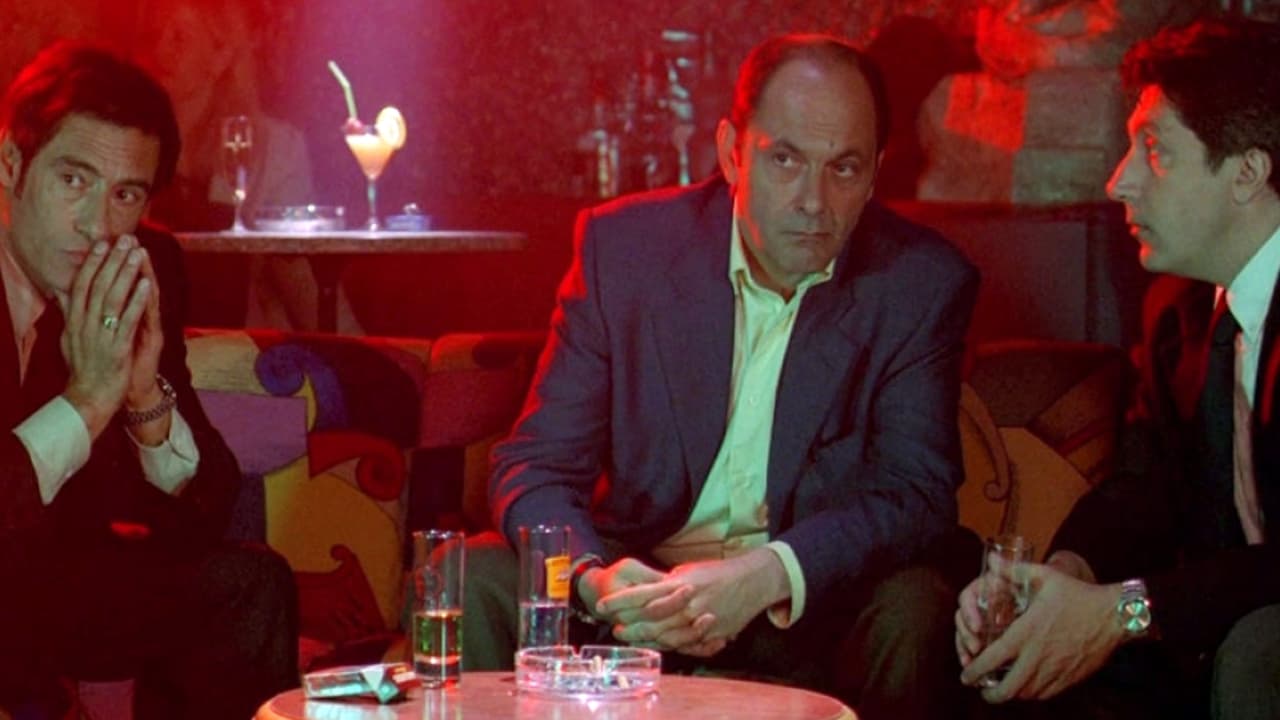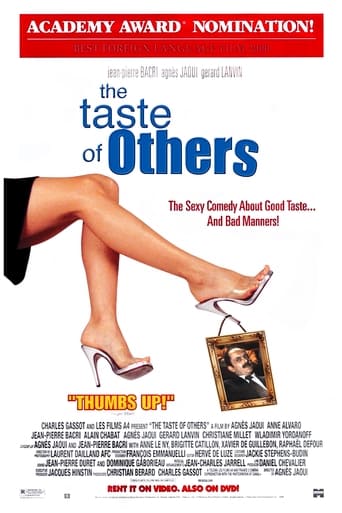

This odd-couple ensemble comedy was reportedly inspired by "Hannah and Her Sisters," but in this case co-writers Jean-Pierre Bacri and Agnès Jaoui are working on a bigger canvas with a broader brush. Instead of those wrapped-too-tight Manhattanites and their 85-room apartments (very common in NYC), we get a dufus businessman's Norman cottage done up in Late Laura Ashley and the tiny "piaules" where a cute waitress (Jaoui, who also directed) cooks pasta for her boyfriends and deals a little hash or, as the case might be, a lovelorn chauffeur practises his flute. As the title suggests, there's an element of culture clash—M. Castella, the businessman (Bacri), is blown away by an actress's performance in a Racine tragedy ("Crap, it's poetry!," he grumbles as the play begins), but she can't get too interested, at least in principle, in a guy who tells peepee-caca jokes and confuses "Rigoletto" with the Juanita Banana jingle (she doesn't even know about the Danielle Steele thing ). And as with Woody, the script does pander a bit—M. Castella finally gets it right when he buys an opera CD and, to atone for an antigay slur at a gallery opening, an abstract painting that clashes with his wife's decor. Likewise, there's a funny moment when M. Castella's tough-guy bodyguard, Frank, exercises his droit de coolest guy in the room (trying hard to avoid a spoiler here), but it's the flute-playing chauffeur, Bruno, who turns out to be the better man. I'm not sure there are too many life lessons for us here, but "The Taste of Others" is lively and involving from start to finish; the dialogue is sharp and slangy, and if you learned French in high school, you may pick up some useful new words. Available on disk from Netflix.
... View MoreAgnes Jaoui directs this film which makes a strong case for tolerance-but not simply for liberals and artists and those for whom the claim for tolerance is often made, but also for those who are possibly more old-fashioned or perhaps not as progressive but who just don't realize all the artistic and cultural life in the world.This is a very clever film, well-crafted and even-handed to all. It is about an actress, Clara (played as a jaded, depressed, but ultimately optimistic person by Anne Alvaro) who is "a- woman-of-a-certain-age" and who, while professionally somewhat successful, is lonely and would like to have a child before the window on that opportunity closes. Separately, as the film begins, Castella (director and character Manie (Agnes Jaoui)'s real life husband, Jean-Pierre Bacri) is a successful businessman who is in negotiations for a possibly huge payday with some Iranian businessmen. However, he is frustrated by the routine of his life, and perhaps its predictability, not to mention his shallow, superficial wife Angelique (Christiane Millet), whose main concern in life seems to be the tastefulness of her home. She also, quite humorously, questions the judgment of numerous people whom her spoiled dog attempts to bite. She thinks that the dog is always justified in biting them and obliquely blames them for provoking her dog. This is a funny sub-plot throughout the film.Not surprisingly, Castella is brusque and abrasive, so when he meets Clara who also serves as a private English tutor, he is surprised to discover that, while she is not like most people he knows, he is interested in her and what makes her "tick". He is almost completely culturally ignorant; however when he attends a Shakespeare play a niece is in and finds Clara performing in that, he is suddenly transfixed (attracted not just to her but to the power of the arts-and perhaps he is not even consciously attracted to her at that point-he is just intrigued by the power of the arts). He begins to put extra effort into learning English and also attends her other plays, not only to impress her, but also to better himself. It's clear that he is interested in Clara and increasingly wants to broaden his horizons, particularly from his petty, small-minded wife.One can see that this is another world opening up to him that he was ignorant of but which seems to have shaken him from his cloistered world. Clara is a little-less-than-sure that she appreciates his ever increasing interest in her though. In fact she absolutely is not attracted to him, at least at first, ironically believing him too philistine and brutish. Although well-intentioned, Castella is, as stated, culturally ignorant, and his tastes seem to them too gauche by half. They mock him by maintaining during a dinner conversation that Ibsen was a light-hearted playwright and by pretending to enjoy his bland, juvenile humor while they laugh behind his back. As this happens more and more, Clara becomes more upset with these artistic friends (Wladimir Yordanoff, Xavier de Guillebon, Raphael Dufour, Anne Le Ny) for belittling a man whose interest in their work is, ironically, more serious than their attitudes towards almost everything. While Castella becomes more versed in cultural works, it's not clear that Clara's friends are any more appreciative of his company, although Weber (Xavier de Guillebon) is happy to take the large commission Castella offers him for a fresco on the front of his office. There are misunderstandings on both sides, but what is interesting about this film is that, while Hollywood could not make a film like this without mocking Castella remorselessly, in this film, one ultimately feels more sympathy for him than for the artists who are often the victims of humiliation and harassment. Also crucial to the film, and excellent in their performances, are the director herself, Agnes Jaoui as Manie, a bartender who sells a bit of weed on the side to make ends meet. She is the very definition of a free-spirit, seemingly not overly bothered by anything. She has a fling with Bruno (Alain Chabat), Castella's bodyguard during the negotiations for the Iranian contract. Bruno claims to have bedded 300 women and seems detached and uninvested in relationships. He and Mani have the same sort of attitude toward relationships, it would seem, but he is critical of her selling marijuana and ultimately their relationship proves unsalvageable. Without giving too much away, the ending of the film seems fair, based on what we know about the characters. Jaoui gives all the characters adequate screen time and controls characters' revelations well, allowing for disclosure at a good rate-not disclosing too much too quickly, allowing the characters to mature. Jaoui and Bacri are excellent. Bacri, while I don't know his work, would seem to be a very capable actor. Perhaps it is his resemblance to Peter Sellers, but I thought he would make a fabulous comic actor. He seems to have a wonderful control of playing the straight man, as people such as Leslie Nielsen and Peter Sellers have done so well. Jaoui, I also liked. Apart from the fact she is very cute =) she is the most level-headed in this film, it seems to me, never allowing much to get her too up or too down. An excellent, very insightful meditation on the human condition. Very enjoyable and yet you realize you've seen a very insightful film too. This revelation creeps up on one. I laughed harder at The Dinner Game, but this film is wise as well as being quite amusing in places.
... View MoreWhat a joy to find a film written and acted by Adults to inform and entertain Other Adults. Matrix-loving-popcorn heads can give this one a miss and hurry to the next American Pie infantalia. What a joy, too, to realize that the Cesars got it right this time around and handed this entry a bagful. There is so much to ENJOY here from the circular storyline - Castella owns a factory and employs a chauffeur and a bodyguard. His wife drags him to the theatre where a neice is appearing in 'Berenice', a French classic in verse. Castella is a complete philistine from the shoes up and would rather give the play a miss and come back for the curtain. BUT, surprise, surprise, playing the lead is Clara Davaux, a woman he had interviewed as an English teacher and dismissed without a second thought. Now, he sees her in a new light and falls in mid-life crisis. Clara drinks and eats in a bar where Manie works. Manie deals on the side. Castella drops in for a bite to eat with chauffeur and bodyguard. It seems that the chauffeur has had sex with Manie and does not remember. They resume their relationship whilst Castella now books English lessons from Clara like there's no tomorrow. The chauffeur introduces Manie to the bodyguard and before long he and Manie are in the sack as well. All roads lead back to Castella and after being attacked he winds up in Manie's bathroom for some tlc. By now he has declared his feelings for Clara and been deep-sixed, yet when she stars as Hedda Gabler she longs to see him in the audience. The acting is so perfect it makes your teeth ache. The scene where Castella reads Clara a poem he has written for her is painful to watch because it is written and acted with such honesty. Both writers - Jean-Pierre Bacri (Castella) and Agnes Jaoui (Manie), who also directed, have not flinched from writing scenes in which they come off the worse for wear. Of course, with the track record of Jaoui and Bacri - before this they wrote and starred in On Connait le Chanson and Un air de famille - you expect only the finest and that is what they deliver here, even Bacri's character name, Castella, has overtones of Bob Castella, the great pianist-composer who was, for decades, the accompanist for Yves Montand. I can only guess whether any homage was intended but whether or not it is just another bonus to an unforgettable film. This was Jaoui's debut as director and her second effort (working title: Comme d'un Image, is now in the Cutting Room. She's gonna have a tough time eclipsing this one but if she DOES ... 10/10
... View MoreThis film teaches us to appreciate "The Taste Of Others". It's about embracing the differences in others, while loving yourself for being different. We all judge people because they are not like us. If you really look and learn, you will see that these people have something to offer. They have a new and different perspective on things. Alright, enough preaching. I'll let the movie speak for itself.There is alot of talking in this film and not alot of action like in the film "Amelie". If you don't speak french, you are in for alot of subtitle reading. Still you will get alot out of it. Even though it was a major winner at the Cesar awards(French Oscar's), it's pretty good just the same. ENJOY!!
... View More